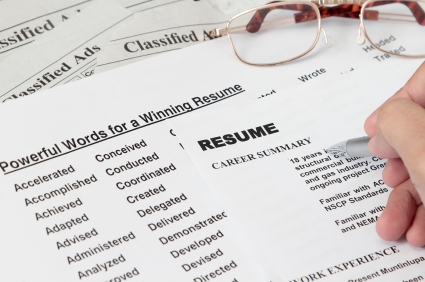
The days of having a generic, all-purpose resume has been replaced by the need for highly developed, targeted resumes. Now you must tailor make your resume to fit into the job description offered by the employer. Targeted resumes aren’t just a necessity, they are critical to you finding long term employment. Targeted resumes put forth your best face and allow HR Managers to see exactly what you bring to the company.
Targeted resumes enable a job seeker to market their skills by addressing a specific concern for the company. It allows them to see how your skills and past experiences will fit in closely with what they require. They also use targeted keywords that closely fit and attract attention to the needed qualifications for the position. You should play up your strengths and focus your attention there, but do not dismiss your past failures, embrace them and take responsibilities in them. But you don’t have to make them the focal point.
Chances are your resume is an all-purpose resume. What everyone likes about the all-purpose resume is that its broad and captures the wide appeal of employers. But saving time is not important, if you really want that job you have to have a complete targeted resume for each position you apply for. But don’t toss that original resume just yet, you still can use it as your base for completing your targeted resume.
Steps to creating a targeted resume
Use your all-purpose resume to build off of, this will save you some time in creating a brand new resume every time you apply for a job. It’s actually fairly easy to take your existing resume and tweak it to fit your needs. So here’s how you proceed:
Create your all-purpose resume
Think of everything that you’ve done in past jobs, experiences, education, clubs, sports teams, anything that you could use as a basis for who you are. Your all-purpose resume is the heart of your resume, employers will never see it but it will allow you to paint a lush picture of your overall capabilities.
Review the job requirements
If you find a job you are interested in, look over the job requirements in the ad. Review the requirements and see how your education and experience stack up with what they are looking for. You want the job to be a good fit and this is an important step of the process. Use the job requirements as your basis for altering your all-purpose resume. Highlight what the job requirements highlight. Tailor make your resume to fit what the company is looking for. Be careful not to overindulge.
Develop your targeted resume
When finished with researching requirements, you need to actually alter your resume. Look over your existing resume to see how you can alter it into the final product you will send to HR Managers. Add secondary keywords, accomplishments, training and skills to round out the resume. Your all set, now you just need to ace that interview.
What is the Best Way to Connect with Social Media Peers
Career & WorkplaceJob SearchNetworkingResume KeywordsSocial Marketing/Online Branding
Finding the right Social Media balance takes more than just knowing how to update your profiles. Firing off quick Twitter updates or Facebook comments will not get you noticed on job boards or help you find open positions.
If you’re not receiving the right kind of attention through Social Media, you should change your strategy. You must be able to connect with your Social Media peers. It’s not as simple as it seems and you must be diligent.
Learning on the fly can be hard, but these tips will help you on your way:
1. Update your LinkedIn profile with the most accurate, up-to-date information.
I cannot advocate this enough – you need to a strong representation of your talents, skills and experience in order to have a fully functional LinkedIn account. Review your Summary and Specialties areas with appropriate keywords, phrases and any information prospective employers look for. Have past coworkers give you quality recommendations. Return the favor with similar recommendations from people who have helped you. Build your network by inviting past colleagues and friends who you want to stay connected with.
2. Post your resume to the right online job board.
You want to be highly visible on job sites so that HR managers can find your resume. Some HR managers search job boards, LinkedIn and niche job sites – you need to have your resume in the right place so that when the opportunity comes along you have your resume where people can find it.
3. Update LinkedIn status bar along with your job board resumes.
LinkedIn sends weekly emails to your connections which gives a summary of the activities their connections are involved in. Updating your status allows these connections to know that you are actively looking for a new position.
Recruiters who browse job sites also get weekly updated resume notifications. Whenever you update your resume or save a new one, it gets posted to the job board, allowing HR managers to see your resume more often. Get your name out there!
4. Network!
Talk to your family, friends, colleagues, or anyone. Talk to anyone who might know of an open position with a company you like. You can have them make introductions through LinkedIn to the appropriate person within their company. Many people find their jobs through networking situations, so it’s always a good idea to talk to people and explain that you are interested in their company or open position. Don’t rely on email. You want to be able to actually speak with the right person – putting a face to a voice or an ear to words will go a lot further than simply emailing someone.
5. Create your professional online identity.
This is a combined effort of Twitter, LinkedIn, Facebook and Google+ in a coordinated effort to showcase your talents, skills and expertise. Building yourself up online gives you credibility beyond simply seeing a resume. If HR managers can find out pertinent information about you online, it will improve your chances.
Chronological or Hybrid Resume: Which is Right for Your Job Search?
BlogExecutive ResumesJob SearchProfessional ResumesResume KeywordsResume WritingResumes
We had a recent blog post that asked the question, “What type of resume gets a better response – a chronological resume (that lists out accomplishments from each position) or a hybrid resume (that places accomplishments in one place and list positions under a separate headline–or a mix of that)?” There were a lot of questions about which one we thought was the best, but with so many responses we began to wonder what type of resume is best.
What do you think? What’s your opinion on the matter and do you have any tips for maximizing your resume?
We can look at statistics to see that the average HR manager looks over a resume in about 10-15 seconds. So, a hybrid resume where your accomplishments are listed in one area and job listings in another may work to draw attention since the reader can skim your highlights and skills right upfront. If they like what they see, then your chances of them reading further increase. But, if they have to browse to find your qualifications, they will move on to the next resume. Your choice of resume could change depending on what you type of position you’re applying for. Does your field deal heavily in accomplishments or with experience? Look and see what type of requirements are involved before sending your resume.
Of course there are pros and cons to both. One person responded that they found chronological resumes to be the most requested type by companies hiring, and basing their decision off of that, they believe that it’s the most effective form (this is what I hear often as well). If it’s what the company wants, then that’s what you should give them. Also, they believe that a capabilities resume does not do enough to showcase, specifically, what type of work (or the experience level) you had with your past jobs. Some point to chronological resumes being a little to heavy on text, making it hard to get a clear picture of your past. You want to showcase what you’re qualified to do, so find a way that works with your skills. It’s not a bad thing to combine resume types as well.
The important thing is finding a job. That’s the bottom line. Whatever resume type you choose to use, recruiters will see that you are the most complete choice for the position. A great resume can make it easier to find a job.
Resume Best Practices (at a glance)
Hybrid Resume
• Make sure to mention which company you achieve great results – “Reduced overhead by $X for McDonalds Worldwide, LLC.” It frustrates readers if they don’t know where you did what.
• When you make mention of past companies, include information so that they can get a sense of the company’s size and scale, including how your position affected the company, assuring that your involvement was really meaningful.
Chronological Resume
• If you’ve had a lot of jobs, you may want to summarize your earlier info. You don’t need to put work history from the 1980’s and early 90’s on it. Too many jobs looks like you can’t sit still, plus summarizing some of your earlier stuff adds interest and breaks the monotony of job after job after job.
• Add key accomplishments to grab HR manager’s interest.
Keyword Dominated Resumes – How Much is too Much?
Executive ResumesProfessional ResumesResume KeywordsResume Writing
There’s a fine line between over using keywords in your resume and having just the right touch. It’s trickier than you think to create a effective and dynamic resume, so what do you have to do in order to get the right about of keywords that balance out the resume?
A lot goes into finding the right way to encode your resume. You need to be able to entice HR managers into reading your resume without rehashing the same old thing. Over the past few years, more and more software programs have been designed in order to minimize the time it takes hiring managers to read through the mountain of resumes they receive. Employers’ are dependent on keywords to find candidates that they want to interview. The key is having the right amount of keywords on your resume. Most companies, including Fortune 1000 companies and smaller companies, know how to use these technologies to assist in finding new hires, so you have to know how to take advantage of the same processes that they do. According to the National Resume Writers’ Association, more than 80 percent of resumes are searched for job-specific keywords.
How do you determine the right keywords?
In most cases, job-specific keywords are nouns. Resume writers have long used action verbs in their resume creation, and that same model is still used. But, what are the action nouns that you need? They depend on the type of position you’re applying for, your field and the type of career you seek. Still, there are many words that will work for a standard, first draft resume.
Say for instance that you’re applying for a customer service job. Some keywords for that job could be “customer database” or “upgrading software”. Review the job description in order to find keywords that match potential employers searches. The typical keywords are often related to the skills and experience each employer will be seeking in new candidates. Other times keywords are precise keywords that HR managers are looking for in order to eliminate a wide swath of candidates. If you do not have “IT Administrative Privileges” as part of your keywords, you will be overlooked for that specific position.
Narrowing down your keyword choices.
You do not want to load up your resume too much with keywords. Instead, sprinkle the right keywords throughout your resume.
One idea to add more keywords is by creating a “Areas of Expertise” or “Core Competencies” section. This way you can add in keywords that represent the bulk of your qualifications in a space that is acceptable to the majority of HR managers. This does not penalize you, but instead enhances what you’ve accomplished.
Because you do not know all of the keywords HR managers will use, it’s a good idea to make use of synonyms or jargon words that will appeal to more specific searches. There are a lot of options available so get some help from a professional resume writer.
Making Sure You Have Strong Cover Letters and Email Messages
Cover LettersInterviewingJob SearchResume KeywordsResume Writing
You know how you always hear, “Typically, recruiters and HR managers look over a cover letter in less than a minute to determine if you’re a strong candidate?” Well, I’m here to tell you that it’s TRUE. Your cover letter must prove to readers that you are a viable choice for the position, and we can show you just how to do that.
Make sure to choose the right greeting in your follow up email or letter.
If you have the person’s name and gender, include this in your greeting. Make sure to use the proper Mr., Mrs., Dr. or title along with their last name. Do not use their first name unless you know the person. If you do not know the gender of the person, you can use an introduction such as “Dear Danny Smith”.
It’s important to have the HR manager’s name correct. If you have questions, then call and ask for the information through the company, or look them up on Facebook or LinkedIn.
Reference the position title, company name and where you learned of the position.
An example of this: “I recently heard of Telecomm International’s open Corporate Liaison Officer position on Monster.com.” This information shortens the time it takes for HR managers to sort through resumes and increases the chances that your resume will be chosen.
Explain why you are the best person for the job.
You don’t want to do a repeat of your resume, but you do want to state how your background, qualifications and abilities will help the company succeed.
Example: “As my resume states, I have the talent, versatility and experience that comes with 20 years in corporate marketing, branding and public relations with Large Multinational Corporations as well as Local Well-Known Businesses. I also have years of experience as a Digital Freelancer working with Company Wide Initiatives that will definitely benefit your company.”
Be sure to include keywords from the job description and make use of power words to elaborate on your capabilities. Reinforce your relevant experience working with the job’s specific duties as well as your knowledge about needed computer programs which were indicated in the job description.
Be Brief.
If you send your cover letter through the mail, make sure it’s one page. Email messages should be kept to around 3-5 small-ish paragraphs. Your paragraphs need to be brief as to not take up too much time.
Include contact information and the best time and way to speak with you.
List your cell phone, home phone and the email address you use the most and let HR managers know how to best contact you through your preferred method. If you are currently employed or in a situation where you cannot return calls, make sure to leave a call back number, or list some times where you are free to talk.
Proof read your cover letter and email message.
Do this over and over until you are sure that everything is in place and you have mentioned the position, company name and included any applicable contact information.
Following these tips will help you to create cover letters and emails that will stand out to HR Managers and recruiters looking for their next candidate.
An End to the Confusion: do I need a CV or a Resume?
Executive ResumesProfessional ResumesResume KeywordsResume WritingResumes
A lot of people have resume questions. Either they have an older resume or this is their first time creating one. That means it can be quite a challenge for inexperienced resume writers or someone who has not had to alter their resume in years. But, with a sore economy and high unemployment, a strong resume or CV has never been more important.
Many job sites will ask for a CV or a resume when you submit your application, yet people still do not know the actual differences between the two. So, in order to alleviate some of these concerns, we’ve put together the comprehensive guide to what makes a CV and what constitutes a resume.
What is the difference between a Resume and a Curriculum Vitae (CV)?
The main differences are the length, the content and your purpose. Resumes are a one to two page summary of your experience, education and accumulated skills. Your story. Typically, you want to be concise and as focused as possible when writing your resume. Most people will only spend a minute or two on reviewing your qualifications, so being concise is extremely important.
On the other hand, a Curriculum Vitae, more commonly known as a CV, is longer (usually starting at about two pages), and much more detailed. They include a complete summary of your education and academic background, teaching and research experience, past publications, presentations, honors and awards, group affiliations and other pertinent details.
When should you use a CV?
When in the United States, a CV is most often used when applying for academic and educational careers, scientific studies, research positions that require grants or other awards. The same is true for a CV, you will need different versions of it in order to appeal to the right audience. Your CV detailing academic findings on fossils will need to be altered in order to get a grant to study extinct plant species.
What should a CV contain?
When writing your CV, you need to include the basics such as your name, contact information, educational history, skills and other relevant experience. Also include research and teaching experience, published works, and grants or fellowships you have received. Any professional groups or different licenses, awards along with relevant information about the position should be included. One option is to create a list of your background information so that you can organize it easily. Include dates on all of the publication information you provide.
How do you write a CV?
Before you start writing a CV, get some help from a professional CV writer. They are different than traditional resumes, so it would help if you had someone to guide you along the process. The first impression is the most important, and that’s what your CV will be, so get help so that you create a broad ranged CV capable of showcasing your skills and experience. Good luck out there.
Does Your Resume Have an Objective?
Executive ResumesProfessional ResumesResume KeywordsResume WritingResumes
Does your resume have an objective?
A resume objective statement is, typically a line or two stating your intention to the reader (note: This DOES NOT mean to add “to obtain a position that is challenging and financially rewarding… etc. THAT is not what I mean). Many HR managers will overlook any resume that does not have a clearly defined career goal – so a resume objective statement–stating what you want to do and what you are good at doing– can be a great way to present your resume to prospective employers. Remember that an objective statement is not the same as summarizing your long-term career goals – it is where you state your goals for your next job–what you can do for them.
Don’t think that an objective statement is necessary for all resumes – they are usually used for specific situations rather than as a standard boilerplate resume requirement. If you’re an entry-level employee or someone looking to change their career path, then an objective statement or title bar should definitely be used. A title bar is similar in that it states the name of the position you want. If you do not have work history that clearly defines your career goals, you will need an objective in order to attract attention. If you are a job seeker with an extensive and relevant work history, a qualifications summary (with a nice branding statement) will be more appropriate.
In order to write an objective statement you need to answer three questions:
1. What type of work are you looking for?
2. What particular skills do you have?
3. How will you be able to help a company that hires you?
When you write your objective statement, you need to focus on how you can benefit your employer, instead of how the employer can benefit you.
For example, if you have experience you could say that you offer a “Dynamic leadership career as Customer Development Executive with a rich mix of special event marketing, team development and leadership, operations management, and sales.” You should avoid phrases that imply you have any particular preferences, like that you are “looking for a position with a team-oriented company” – again, you should focus more on what you can bring to the position rather than what you want from the job.
A good objective statement needs to be specific – it’s not enough just to say that you are looking for a challenging position (ick–don’t do this. I repeat… just DON’T). This says nothing about what your real career goals are. Instead, your statement should briefly list the important qualifications and how they relate to the position. If you’re looking for a specific position, you can reference the job in your objective statement. Make sure you take the time to customize your resume so that you can make a good impression with HR managers, this indicates that you are enthusiastic about the positions they are offering.
The purpose of including an objective statement in your resume helps you eliminate irrelevant information that will not help you get the job that you’re seeking. Anything on your resume that doesn’t support what you have written on your objective statement needs to be removed. Make sure to do your research about the company beforehand and tailor make your objective statement to that position.
What Stage of the Job Search Process is Causing You Problems?
Executive ResumesInterviewingJob SearchProfessional ResumesResume KeywordsResume WritingResumes
Being passed over for a job never feels good. You wonder why the company rejected you and you think that maybe you’re doing something, unknowingly, that is causing you to lose out on career opportunities. The good news, if you can look at the silver lining, is that you now have an opportunity to learn from your mistakes and correct them. You just need to figure out where your mistakes were made and how to avoid making them again.
Rejected at the Resume Stage:
Many times you can place the blame on your resume not meeting the keyword search criteria companies look for in submitted resumes. For example, when an HR manager is looking for a Social Media Expert, they will scan the resume for words such as “HTML Proficient” or “Extensive Social Media Experience” in order to see if the candidate’s expertise and career history matches what they’re looking for. If your resume does not contain keywords that relate to the position you are applying for, your resume may be overlooked right from the get-go.
Correct this situation easily by updating your resume using keywords found in the job description. There are different software options that you can use to identify keywords, but you can also do this on your own, or if you are able to, hire a professional resume writer who is trained specifically to create a resume that is rich in keywords to highlight your best skills.
If you’ve been rejected due to having more experience than the position calls for, you can also make changes to your resume to avoid this issue in the future.
- Delete past jobs that do not correspond to your current search.
- Do not list positions that you have had more than 15 years ago. This makes you seem more expensive and narrows your opportunities.
- Add a personal brand statement to your resume that specifically states that how you are qualified for the position.
Rejected at the Interview Stage:
Think back through the interview. Were there any specific areas that the interviewer negatively focused on? Did they show concern for one area over another? How did you answer specific questions related to the position you were interviewing for? A client once told me that an interviewer remarked that he had had a lot of jobs over a short period of time. My client didn’t know how to respond, and even though he thought the interview went well, he didn’t think that the interviewer could get past that part of the interview, as my client didn’t get an offer extended to him. If you think that you’ve slipped up during the interview, then email the interviewer and ask about how the interview went. Meanwhile, take some time and research tips for being prepared for interviews and interview questions to ensure that you are ready the next time you get called for an interview.
Think honestly about the position. Were you truly qualified for that position or was the company a good match for you? Often times, interviewers can see through veiled attempts to just “land a job”. If this is the case, just accept that the position or company was not right for you and move on. Always make sure that you are applying for jobs that are suitable to your skillset and personality. You may not have all of the qualifications required for the position you are applying for, but if you can show that you have some of skills required for the position, you may still have a shot at getting the job.
Having a resume that truly markets all you have to offer and being fully prepared for a job interview will help you land the right career with the right company. The job search process can be frustrating and tireless at times. Keep a positive attitude and always find ways to evaluate your performance and keep on improving!
